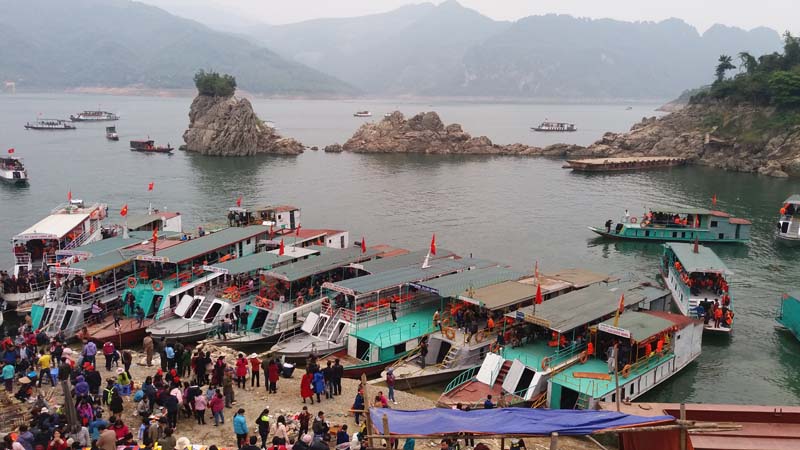
(HBO) – The upland district of Da Bac possesses many key potentials and advantages to develop tourism. The scenes are natural, wild, and majestic, with the significant landscape of Da River water in freshly green, the large and small islands are undulating on the water like "Ha Long on land".
![]()

Thac Bo Temple attracts a large number of
tourists.
The district has a rich and diverse natural
forest ecosystem, especially at Pu Canh Nature Reserve in the areas of Dong
Chum, Dong Ruong, Doan Ket, and Tan Pheo communes with a variety of precious
woods and populations of diverse animals and vegetation, whose values are
available for ecotourism development and scientific research. In particular,
this is the place where many ethnic groups have been living for a long time, including
four main ethnic groups of Tay, Muong, Kinh, and Dao. Each ethnic group has a
diverse culture, and typical identity. The villages are close to the nature
with custom activities, indigenous life style, and unique culture identities,
which are favorable for the development of community tourism.
In addition, the spiritual values are clearly
expressed in the lives of ethnic people. In particular, some typical places are
Thac Bo Temple - the provincial relics, Le Loi gravestone (Vay Nua commune),
which is a spiritual tourist attraction attracting thousands of visitors to
visit and go sightseeing at the beginning of the year. The district also has
national historical relics. In the district, there has initially formed many
major tourist attractions such as Bieu Mountain scenic spots, Lo Lan Cave, Ke
stream, Hien Luong commune; Sam Cave, Vom Cave, Toan Son commune; Ta Khop
waterfall, Dong Ruong commune; Than cave, Vay Nua commune; Lao Stream, Mua
Cave, Sung Cave, Cao Son Commune; Dua Island, Trang Trech village, Vay Nua
commune; Sung Cave (Robinson Tourism Destination), Tien Phong commune, etc.
Coming to Da Bac, visitors can come to the
community tourism destinations to be in harmony with nature beauty, feeling the
peaceful life, friendly and hospitable people through living activities,
costumes, unique ethnic cuisine in the village.
With the mobilization of all resources, the
potential and advantages of tourism have initially been exploited effectively
to contribute to improving the material and spiritual life of local people in
the area. Up to now, the district has 7 tourist accommodation establishments
with 47 guest rooms and 3 community tourism spots, 9 households doing community
service businesses in Hien Luong, Tien Phong and Cao Son communes.
Located just a 20-minute drive from Hoa Binh City, Ora Hill Farmstay & Glamping Hoa Binh is a captivating new destination nestled in Mo hamlet, Bình Thanh commune, Cao Phong district. Combining farming with leisure, this tranquil retreat is perfect for those seeking balance, joy, and an immersive experience in the expansive beauty of nature.
Muong Bi - Tan Lac is renowned as one of the four famous Muong regions in Hoa Binh province. Blessed by nature with a favourable climate and stunning landscapes, Tan Lac holds great advantages for tourism development. The local tourism industry has made remarkable strides in recent times thanks to the attention and support from the local authorities and sectors.
With its strategic location, well-developed transport network, and diverse soil and climatic conditions, Hoa Binh is emerging as a must-visit destination in Vietnam's northwestern tourism corridor. The province boasts numerous attractions, including the Kim Boi hot springs (Kim Boi district), the Dau Rong cave complex (Cao Phong), the Mai Chau valley (Mai Chau), and the iconic Hoa Binh hydropower plant.
The northern mountainous province of Hoa Binh has been listed among the 71 most beautiful places to visit worldwide by the prestigious US travel magazine Condé Nast Traveller.
Hoa Binh province’s rich natural and cultural resources position it as a prime location for developing community-based tourism (CBT). In recent years, support from central and provincial policies, as well as assistance from non-governmental organisations, have encouraged local ethnic minority and mountainous communities to actively engage in the sector.



